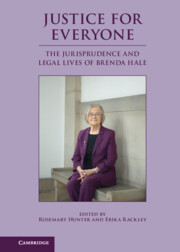Book contents
- Justice for Everyone
- Justice for Everyone
- Copyright page
- Contents
- Figures
- Tables
- Contributors
- Acknowledgements
- Table of Cases
- Table of Legislation
- Table of International Treaties and Conventions
- Brenda Hale Bibliography
- Part I Introduction
- Part II Personal Reflections
- Part III Academic
- Part IV Law Commissioner
- Part V Judge
- Judicial Leadership
- Family Law and Children’s Rights
- Human Rights and the State
- 23 Orthodox Principles and Unconventional Outcomes in Public Law
- 24 Lady Hale
- 25 Baroness Hale
- 26 ‘A Homemaker as Well as a Judge’
- 27 Gender Equality and Article 14 ECHR
- Private Law and the Individual
- Part VI Creative Encounters
- Index
24 - Lady Hale
Rights, and Righting Wrongs, in Immigration and Nationality
from Human Rights and the State
Published online by Cambridge University Press: 05 May 2022
- Justice for Everyone
- Justice for Everyone
- Copyright page
- Contents
- Figures
- Tables
- Contributors
- Acknowledgements
- Table of Cases
- Table of Legislation
- Table of International Treaties and Conventions
- Brenda Hale Bibliography
- Part I Introduction
- Part II Personal Reflections
- Part III Academic
- Part IV Law Commissioner
- Part V Judge
- Judicial Leadership
- Family Law and Children’s Rights
- Human Rights and the State
- 23 Orthodox Principles and Unconventional Outcomes in Public Law
- 24 Lady Hale
- 25 Baroness Hale
- 26 ‘A Homemaker as Well as a Judge’
- 27 Gender Equality and Article 14 ECHR
- Private Law and the Individual
- Part VI Creative Encounters
- Index
Summary
British immigration and nationality are closely linked with no sharp legal demarcation between immigration control and nationality rights. Liberal rights connected to membership (citizenship) and territory (long-term residence) which underpin and attach to immigration and nationality status are often viewed in law through the lens of formal equality as abstract and decontextualised. When such cases come to the appellate courts, it is possible for judges to apply the law without questioning the variety of life characteristics and situations that result in individuals being rendered especially vulnerable within immigration and nationality regimes. This has not been the approach of Lady Hale. She has adopted a contextual approach through which she can draw in the wider effects of social phenomena, such as political and legal developments, to ensure substantive equality. Perhaps the best example of her approach is found in her judgment in Homer v. Chief Constable of West Yorkshire Police, where she explained the need to consider the potentially indirectly discriminatory effects of formal equality as follows: ‘The law of indirect discrimination is an attempt to level the playing field by subjecting to scrutiny requirements which look neutral on their face but in reality, work to the comparative disadvantage of people with a particular protected characteristic.’ Lady Hale’s words in Homer demonstrate how she interrogates and unsettles some widely accepted notions in the law so as to assess their differential impact on vulnerable people, particularly women and children. When the statutory provisions have breached human rights, Lady Hale’s judgments have made use of the Human Rights Act mechanisms to remedy the breach.
- Type
- Chapter
- Information
- Justice for EveryoneThe Jurisprudence and Legal Lives of Brenda Hale, pp. 269 - 277Publisher: Cambridge University PressPrint publication year: 2022
- 1
- Cited by

